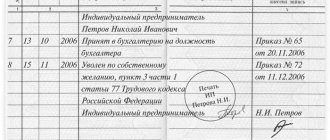What the law says about self-registration
Let's start with the fact that there is an agreement itself (DDU), in which there is no mention of who will register the document. An additional agreement is attached to the contract, which deals with various services provided by the developer for a fee, in particular, document registration is precisely the additional service that the developer provides to the shareholder.
Federal Law (FZ-214) determines that the relationship between the shareholder and the developer is regulated by the provisions of the Law “On the Protection of Consumer Rights” (LZPP). Article 16 of the PZPP states that the purchase of certain goods or services cannot force the consumer to purchase other goods or services.
In other words, the developer cannot impose on the shareholder the service of registration of the DDU (registration of real estate ownership, as well as other services), if he does not want it, the shareholder has every right to independently register the agreement with the developer in Rosreestr.
However, today the registration of a DDU by the developer is a generally accepted practice; the vast majority of shareholders, without hesitation, pay the developer for registration. In some cases, it is indeed easier for the equity holder to pay to have everything done for him, especially if he has never had to deal with such issues. But most often, clients of development companies simply do not suspect that they can refuse the registration service and do everything themselves, while saving money.
Ready package of documents
When the date for receiving the submitted documents arrives, all participants in the DDU receive registered papers, namely:
- DDU with a mark of registered ownership;
- an extract from the Unified State Register of Real Estate, which replaced the usual certificate;
- originals of submitted documents.
Before picking up the documents, you need to carefully check all the points. In case of an error, force the contractor to redo the papers.
If the DDU is associated with a mortgage, then:
- The DDU has two marks, one about the registered property right, the second about the existing restriction of the right;
- A registered mortgage, which is issued only to a bank representative or to the owner with a power of attorney from the lender;
- Extract from the Unified State Register of Real Estate with information about existing rights and restrictions.
Despite the similarity of the final documents when registering a private trust with and without a mortgage, the information contained differs significantly. This difference concerns the section indicating the right, which in a mortgage is specified with a limitation.
How much? How much does it actually cost to register a contract?
It must be said that the developer asks for considerable amounts of money as payment for this service; the cost of registration (for reasons that are not entirely clear) starts somewhere around 30 thousand rubles, and the cost of the entire package of additional services may well exceed 300 thousand rubles. As a rule, developers tie the amount of payment for registering a preschool educational institution to the cost of the apartment; a percentage ratio of the cost of the purchased housing to the amount of payment is taken. So, today builders and developers take up to 1% of the cost of an apartment.
By the way, developers began to gradually move away from this practice, accepting a certain fixed value for the cost of their services.
Perhaps this is happening for the reason that shareholders have recently become more literate, and it has become increasingly difficult for managers to answer awkward questions. Indeed, it is difficult to explain how the square footage and cost of housing can affect the cost of a service (in fact, a set of the same actions performed in a standard sequence).
In fact, the price of the service that developers impose in one way or another is too high, even with a minimum price tag. The entire registration procedure boils down to the submission of a set of documents (on the part of the developer and the shareholder), and this is usually done “in bulk”; dozens of contracts are simultaneously sent for registration. And yes - the developer is required to submit a complete set of documents on his part only once, when the first residential building is concluded and registered (in the residential complex under construction). Project documentation, permits, etc. are submitted once, and then, together with the shareholder’s package, the developer submits an application for his consent to the contract, etc.
After the “opening of registration”, re-submission of the entire package of documents provided is not required; mainly, information that concerns each shareholder is needed.
How did the consumer become accustomed to paying quite significant sums for such an easy task for the developer? It is very profitable for the developer to receive good money, in fact, for nothing. If at the construction stage the main funds paid by equity holders are spent on purchasing building materials, paying workers, ensuring the operation of equipment and special equipment, then at the registration stage the investments are minimal.
Actually, all the costs that the equity holder will face will be limited only by the state duty (up to 350 rubles), and transportation costs (and this is not a fact: documents can be submitted to the nearest MFC or even via the Internet).
The state of affairs with the registration of preschool educational institutions in the modern market
The developer benefits from the lack of clear and structured information about the order in which the registration procedure must be completed and what documents must be provided. Operators of Rosreestr and MFC are often not aware themselves, since such requests are extremely rare at the moment. Accordingly, representatives of the developer themselves are also not eager to advise anyone on this issue. Therefore, when registering a preschool education on your own, you will really have to make some efforts.
Often, the developer’s managers insist that the company register the contract if the conversation nevertheless turns to this, since most clients continue to consider the service mandatory. Accordingly, various preferences are provided for clients who are inclined to pay the requested amounts for registering a preschool educational institution (when choosing an apartment, etc.). Various bonuses are also provided for the salespeople themselves if they impose a service, so if there is a good flow of clients, they can, under various pretexts, refuse those who do not want to pay extra money.
No one will officially refuse to sign the DDU, since this is clearly contrary to the law (described above). For example, a “greedy” client is given the opportunity to buy a home, but without booking a specific apartment, the developer allegedly does not know when the client will register the contract, or whether this will happen at all. As a result, the client may receive, to put it mildly, not the most favorable conditions.
Further, the registration procedure involves the submission of documents by two parties at once; if the developer can submit documents for the shareholder (through a power of attorney), then the chances that the developer will issue a similar power of attorney to the shareholder are almost zero.
As a rule, managers explain that in order for the shareholder to register the agreement himself, a meeting between the developer’s representative and the shareholder is necessary at the place where the documents are submitted (in this case, the developer needs to state his consent to enter into an agreement with the shareholder, since the remaining documents have already been submitted by the developer).
Accordingly, the developer may refer to the impossibility of assigning a manager who would deal with the individual shareholder personally, thus, the registration process can be delayed until the moment when the best apartments are sold. However, few people know that in fact the developer can submit documents on his own behalf and without the presence of the shareholder.
Self-registration of preschool education
There is a way out of this situation. A shareholder who does not want to pay extra money and can find the time to complete the registration on his own is faced with a task consisting of two stages. First, you need to ensure that the developer provides the client with the opportunity to exercise his legal right, and then you just need to transfer a set of documents to Rosreestr.
“We persuade” the developer
Now we will present a method that will help the shareholder refuse the additional service. At the stage of signing the DDU (this happens in the sales office), you do not need to ask unnecessary questions, but simply sign the DDU itself, as well as an additional agreement - an agreement on the provision of paid services, which will list various services, the procedure for their provision, the amount of payment, including and registration service for preschool educational institutions in Rosreestr. After signing, the client receives a list of documents that must be provided to the development company so that its representative can fulfill the obligations under the two contracts.
The very next day you need to come to the sales department with a statement of desire to terminate the additional agreement (at the same time, your agreement to comply with the terms of the main document is confirmed). The application is written in two copies, one is given to the responsible person (in the transaction service department), and the second is marked with a note confirming acceptance of the application.
Now all that remains is to wait for the result in the form of an official response from the developer. There are two scenarios for the development of events - either the developer agrees to terminate the agreement on additional services or refuses to do so (in writing). In the first case, you can start paying and registering the contract. In the second case, you need to pay the amount requested by the developer, take the official response from the developer, the share participation agreement and go to court with a statement of claim. A written response will serve as convincing evidence that the developer is breaking the law and extorting money for additional services.
If the court rules in favor of the equity holder (and the chances are quite high), then the amount paid under the second agreement will be returned. At the same time, the developer will be obliged to fulfill the obligations under the DDU, since there are simply no reasons for terminating this agreement.
State registration fee
In order for the equity participation agreement to come into force successfully, it must be registered. This process is not free; you must pay the appropriate state fee.
The fee changes regularly. At the time of writing this material, it was 300 rubles for individuals and 600 rubles for legal entities.
Due to such frequent changes, it would not be superfluous to clarify the current cost of the state duty at the time of concluding your DDU.
There is also a fee for registering property rights, which is paid by the shareholder from his own funds and currently amounts to 1,000 rubles.
We prepare documents
In any case, by the time the court makes a decision, the agreement will not be registered, since the developer has not received from the equity holder a set of documents required for this. Therefore, at this stage, the shareholder needs to prepare the necessary papers on his part (the developer, on his part, will provide the necessary documents to Rosreestr) and go to register his child-only home.
The following documents will be needed for registration:
- Identity card or power of attorney, if someone registers the agreement on behalf of the shareholder. If the transaction involves someone who represents the interests of the child, a birth certificate is required; for a person incompetent, the transaction can be completed by his guardian, in which case a certificate of appointment as a guardian will be required;
- Participation agreement. The document must be provided in three copies (for the shareholder, Rosreestr and the developer company); if there is more than one shareholder agreement, then there must be a corresponding number of copies;
- Application for registration, this must be an application from the shareholder and an application from the developer. In case of self-registration, the latter will provide it to Rosreestr;
- If borrowed funds are involved in the transaction, it is necessary to provide a pledge agreement, since simultaneously with the registration of the DDU, the registration of the encumbrance of the rights of claim will take place;
- Documents for the property - a plan of the property indicating the location of the apartment, area and other parameters of the housing. The documents are drawn up by the developer and, at the time of signing the DDU, are agreed upon with the shareholder;
- A document confirming the consent of the spouse to carry out the transaction, certified by a notary. Not required if husband and wife are parties to the transaction.
Due to the fact that changes occur periodically in legislation, the presented list may be changed, so you need to check it with Rosreestr. When submitting documents, you need to pay a fee (up to 350 rubles), you do not need to provide a receipt, simply if there is no information about payment within five (working) days, Rosreestr will suspend registration and return the package of documents without examining it.
Assignment of rights under the DDU in a new building.
Concluding a DDU is possible if an apartment in a new building is purchased directly from the developer. In cases where the seller is a co-investor or the apartment is purchased from a third party, another type of agreement is concluded - assignment of rights. Registration of the assignment of a DDU does not imply the transfer of an apartment, but of the obligations and rights that are provided for in the contract.
The process involves not two, but three parties: the seller who signed the agreement with the developer, the buyer and the construction company itself. After the transaction is concluded, the buyer resolves all issues that arise with the developer.
The peculiarity of the contract for the assignment of rights is that the rights are transferred long before the delivery of the object and the possibility of its operation. Transfer of rights is possible before receiving the transfer and acceptance certificate, but it is impossible to do this without the participation of the developer’s organization. If the DDU agreement was concluded after registration of the mortgage, the purchased apartment is under an encumbrance. In this case, the bank's permission will be required to conclude the transaction.
One of the features of the assignment (assignment agreement) is that after replacing one of the parties (the person who is the buyer of the property under the DDU), the terms of the initial agreement do not change. The developer continues to be responsible to the new buyer for the same obligations specified in the primary contract. As a result, upon termination of such an agreement, the buyer will not be able to return the price that was paid by him under the agreement of assignment of rights. And the initial cost of the object, which was paid upon the conclusion of the agreement by the first buyer. One more nuance - the developer has the right to request a percentage for concluding such a transaction - this issue is not regulated at the legislative level.
The assignment of rights under the DDU can be carried out with individuals or legal entities. Those who entered into a contractual agreement with the developer or received apartments as payment for work or services. For example, a development company may transfer part of the apartments to the municipality that provided the land for the construction of the facility.
We submit documents and collect the registered agreement
You can submit documents at the territorial office of Rosreestr, through the MFC, via the Internet (Rosreestr website or the Unified Public Services Portal), or by post. In addition, it is possible to transfer documents to a representative of Rosreestr during an on-site reception (if the ability to move is limited, this is free, in other cases on a paid basis).
Registration (by law) must be completed within seven working days; if documents were submitted through the MFC, then it will take a couple of days longer (including postage). After the specified time has passed, you need to receive the registered contract in your hands, and a registration inscription will appear on the document.
Registration procedure
It is divided into several stages, which are as follows:
- Preparation of a complete package of documents . The list may change depending on the situation - the presence of children among the owners, a mortgage loan.
- Payment of state duty . This must be paid before submitting your application. Otherwise, documents will not be accepted for consideration.
- Submitting an application with a package of documents . This can be done in several ways - through Rosreestr or MFC. In this case, it is important to have the presence of not only the shareholder, but also a representative from the developer. A receipt for receipt of documents is issued and a date is set when they can be picked up.
- Documents receiving . Together with them, an extract from the Unified State Register is issued, which contains information about the unfinished construction project and the copyright holder.
Documents can be sent by mail or electronically. In the case of mail, notarized copies are sent. Documents can be submitted online on the Rosreestr or State Services website. An electronic digital signature is required for submission.









